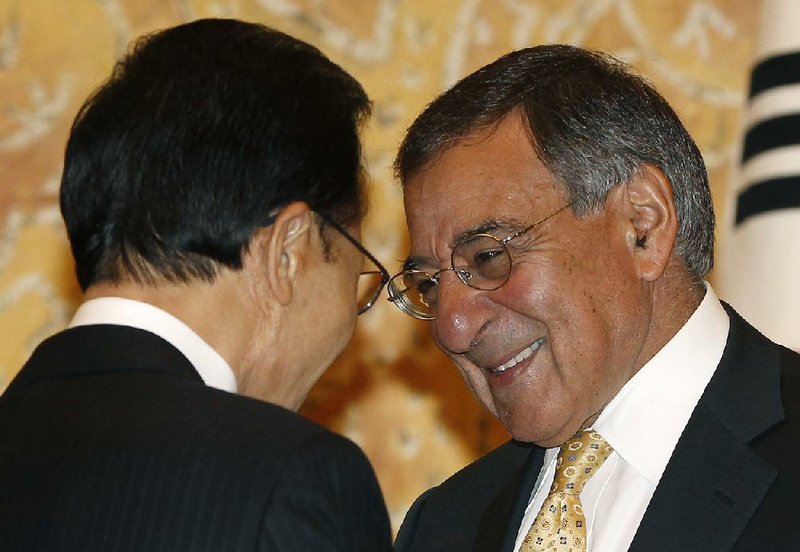SEOUL, South Korea — Defense Secretary Leon Panetta expressed doubt Thursday that diplomacy will persuade North Korea to surrender its nuclear weapons, and he raised the prospect of stalemate leading to “escalation and confrontation.”
After day-long meetings with South Korea’s government leaders, Panetta told reporters he was concerned by North Korea’s pattern of deliberately shifting from periods of modest accommodation with the West to episodes of violent aggression, perhaps with no real intention of giving up its nuclear ambitions.
Asked whether he thought a renewed effort by the Obama administration to explore a possible new round of international negotiations with North Korea would work, Panetta was blunt.
“We’re not sure where those talks are headed at this point,” he said, referring to discussions held this week in Geneva by American and North Korean diplomats. The talks yielded suggestions of progress but no apparent breakthrough.
“For that reason, I guess the word ‘skepticism’ would be in order,” he said.
The Pentagon chief said he believed, nonetheless, that efforts at a diplomatic solution must go on.
“On the one hand, we have to engage,” he said. “We have to try to seek the hope that ultimately they’ll do the right thing and join the international family of nations. ... But I think we always have to be cautious that at the same time, they’re going to continue to develop their nuclear capability.”
In the same session with reporters, the commander of U.S. Forces Korea, Army Gen. J.D. Thurman, indicated that he suspects the North Koreans are determined to keep up the expansion of their nuclear capabilities.
“Based on what I have observed, they show a willingness to continue to develop and test capabilities that can be associated with their nuclear program,” Thurman said. “This is something we’ve got to remain vigilant on.”
Separately, the State Department’s top Asia policy official, Kurt Campbell, was in the South Korean capital Thursday to brief officials on the Geneva talks.
North Korea’s Foreign Ministry issued a statement saying the talks “helped deepen each other’s understanding.” The statement said both sides agreed to further talks on whether to resume the international discussions involving North and South Korea, Japan, China, Russia and the United States.
Panetta said China, a longtime North Korean ally, “can do more” to push North Korea to give up its nuclear program.
“There are moments when we think that they are urging North Korea to engage, but frankly I think China can do more to try to get North Korea to do the right thing,” he added.
“I know that sometimes they make that effort and sometimes North Korea doesn’t pay attention,” he said.
Panetta’s first visit to South Korea as defense secretary is part of a broader U.S. effort to shore up South Korea’s confidence in a military alliance that has endured for six decades.
Panetta met with the South Korean defense and foreign-affairs chiefs and paid a courtesy call on President Lee Myung-bak.
In parallel talks, the new chairman of the U.S. Joint Chiefs of Staff, Army Gen. Martin Dempsey, and top officers from the U.S. Pacific Command met with top South Korean military officers for an annual review of the U.S.-South Korean military alliance.
Panetta planned to attend a second round of alliance talks today before flying home.
Panetta has called the North “reckless” and a “serious threat” to peace on the Korean Peninsula, which exploded in war in 1950 and drew the United States and other nations into a three-year conflict against the North and China.
Panetta was asked by reporters what he thinks can be done to break a cycle of North Korean behavior in which it alternately makes gestures of accommodation to the West, followed by provocation.
“The cycle ultimately has to be broken,” he said. “There is either going to be an accommodation where they decide to make the right decisions with regards to their future and join the international family of nations ... or, if they continue these provocations, then obviously that’s going to lead to the possibility of escalation and confrontation.”
Among the maneuverings that influence U.S. thinking about the security threat posed by North Korea is the process now under way in which the supreme leader, Kim Jong Il, is expected to turn over the reins of power to his son, Kim Jong Un, a newly minted four-star general believed to be in his late20s. He would be the thirdgeneration leader in a family dynasty that has ruled since Kim Il Sung founded the Democratic People’s Republic of Korea in 1948.
U.S. officials are unsure what timeline has been set for the leadership succession. But two senior American military officers in Seoul said it appears the process has slowed, possibly because Kim Jong Il’s health problems seem to have eased. The officials spoke to a group of reporters on condition of anonymity because of the sensitivity of the topic.
Front Section, Pages 2 on 10/28/2011
